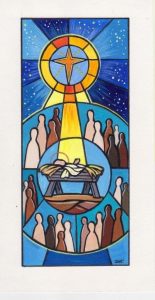
When asked to write about the feast of 6 January called ‘Epiphany’, I discovered that Eastern and Western Churches emphasise different aspects of the theme ‘manifestation’, which is the meaning of the Greek word ‘Epiphany’.
Eastern Churches focus on God’s manifestation of Jesus’ divinity at his baptism and at Cana, where he begins his public ministry. In the West, selected Mass texts highlight the early Church’s conviction that Jesus Christ has significance for all humankind. The gospel of Matthew 2:1-12 narrates the story of the Magi, an encounter between Jesus and three Oriental Wise Men, who, borne by camels, deliberately seek Jesus, bringing gifts and paying him homage.
The commencement of the Western Church’s Epiphany Mass leads towards that gospel of Matthew 2:1-12, a narrative unique to Matthew’s gospel, revealing its author’s intent to portray Jesus as the fulfilment of Israel’s prophecies. The collect prayer invites the assembly to “behold the beauty of sublime glory” embodied in Jesus.
The ancient reading from the prophet Isaiah 61:1-6 then casts Jesus in messianic ‘light’, as one who draws the peoples ‘from the nations’, revealing God’s ‘glory’ in an experience where-in their ‘hearts will be throbbing and full’. That text speaks also of camels bringing gifts for a ‘king’, whom the responsorial psalm [71] depicts as one worthy of particular honour because of his justice, his spreading of peace ‘from the Great River to the ends of earth’s bounds’, and his ‘saving’ attention and ‘pity’ towards the ‘poor’, the ‘needy’, the ‘helpless’ and the ‘weak’ whose ‘crying’ he hears and, presumably, heeds.

Whilst mulling over these matters I also happened upon a news item from Cable Beach, Western Australia. On Christmas Day each year, apparently, working camels there are given a day off and a feast of special carrots. I wondered whether this custom may have originated in honouring the camels who carried the Magi to visit Jesus.
So now, dear reader, bear with me a little, as I play with this personal piece of creative wondering, and see where it leads.
Throughout my recent musings on Epiphany, I have been conscious of camels. In a sleepy reverie one night, I imagined I met one who ‘told’ me her name is Aaleyah [Arabic for ‘gift of God’]. She was keen to announce her descent from camels brought to Australia from Afghanistan in the 19th century. Then she seemed proud but hushed in claiming descent also from the camels who carried the Magi. She told how their touring party became fascinated with heavenly signs hinting at the birth of someone significant. Wanting to honour such a person, she said, the Magi enquired first from King Herod who fell into anger, sending the Magi off to find any child rivalling his royal line, and asking them to report to him with news.
I asked Aaleyah if she ever heard what the Magi said amongst themselves after meeting the Holy Family before choosing to return East rather than go back to Herod. She said she was aware of a clear tradition that the travellers left Jesus thoughtfully, with their hearts ‘throbbing and full’. Deep inside they knew that in him and his family they had encountered a manifestation of God’s Goodness, Love, Compassion and Justice. They had experienced a redefined type of ‘kingship’ which shone through their style of humility and the witness they gave to a trusting ‘yes’ they shared with God in their lives.
Along with Jesus, Mary and Joseph and the Magi, I will remember Aaleyah this Christmas and thank her for joining me in my own reverie. I will hope she enjoys her carrots, and I will believe she’s worth remembering.
Virginia M. Bourke rsj
